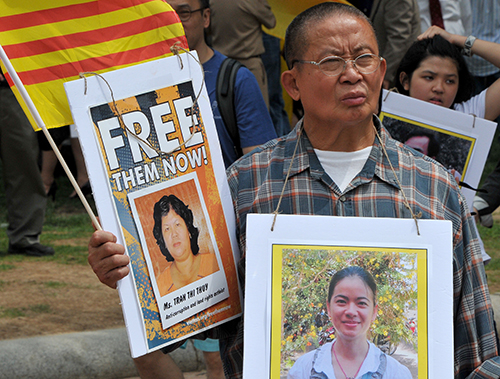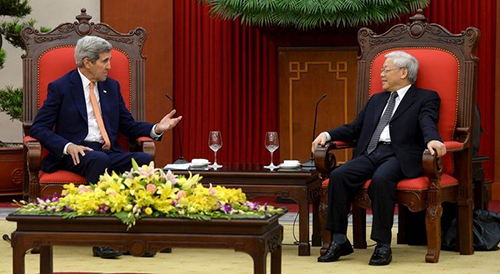Secretary of State John Kerry’s recent visit to Vietnam was made to celebrate the 20th anniversary of diplomatic relations between the former adversaries. While Kerry’s speech during his three-day tour emphasized the need for Hanoi to improve its rights record to deepen bilateral ties, it is time Washington dispensed with vaulted rhetoric and predicated future economic and strategic engagement on the release of jailed journalists.
Kerry’s visit was the latest high-level diplomatic exchange as the two sides stake out the terms of a “comprehensive partnership” signed in 2013, which includes a commitment to human rights. Vietnam plans to join President Barack Obama’s Trans-Pacific Partnership preferential trade pact and end Washington’s decades-old arms embargo imposed over the communist regime’s chronic rights abuses. The U.S. hopes to make Vietnam a strategic partner in its Asia “pivot” policy, a network of bilateral alliances geared to counterbalance China’s regional rise.
Last month, Communist Party General-Secretary Nguyen Phu Trong met with Obama at the White House in what was widely heralded in the Vietnamese and foreign press as an historic visit. In March, Minister for Public Security Tran Dai Quang met more discreetly over a five-day period with senior officials at the State Department, Department of Homeland Security, FBI, Department of Defense, National Security Council, Department of Justice, and CIA, according to news reports.
Both Quang, who is in charge of regular police and public security paramilitary forces, and Trong, who presides over a central body that issues repressive orders, are instrumental in the police state apparatus that systematically ferrets out and crushes dissent against the ruling party, including through the harassment, assault, and jailing of journalists. In light of their recent visits in Washington, U.S. officials have a clear line of communication to those responsible for curtailing civil liberties and with the power to pardon political prisoners imprisoned on anti-state charges. CPJ research shows that most journalists jailed in Vietnam were charged on anti-state provisions defined under Articles 79, 88, and 258 of the penal code.
“Progress on human rights and the rule of law will provide the foundation for a deeper and more sustainable strategic partnership,” Kerry was quoted saying in an August 7 speech in Hanoi. “Only you can decide the pace and direction of the process in building this partnership.” Alluding to Vietnam’s suppressed freedom of speech, Kerry added: “But there are basic principles we will defend: No one should be punished for speaking their mind so long as they are peaceful.” It was not immediately clear from reports if Kerry met with any independent bloggers or journalists during his mostly symbolic visit.

Last year, Vietnamese journalists expressed hope to CPJ that growing engagement with the U.S. and Western countries would encourage the communist regime to be more tolerant of dissent and critical reporting. However, two years since the signing of the comprehensive partnership, the situation for Vietnam’s independent reporters, nearly all of whom publish online, has arguably never been more dire. Vietnam held 16 journalists behind bars when CPJ conducted its annual prison census on December 1, making the country the fifth worst jailer of journalists worldwide. Human Rights Watch estimated in July that Vietnam holds at least 135 political prisoners.
The abuses have continued amid the high-level diplomacy. Pham Chi Dung, chairman of the Independent Journalists Association of Vietnam and a frequent contributor to U.S. government-funded media, was forcibly barred by security officials from leaving his Ho Chi Minh City home on April 30 to report on the 40th anniversary of the fall of Saigon, according to a statement by the association. Before and after Trong’s Washington visit, Dung was interrogated by police on three occasions for interviews he gave to foreign media on U.S.-Vietnam relations, a Radio Free Asia report said. A draft bill on association, meanwhile, threatens to ban the newly formed journalists association because it duplicates functions of existing Party-controlled organizations, the group reported.
Despite Kerry’s rhetoric on rights, it is not clear that he or other U.S. officials have directly linked future engagement to improved freedoms and protection, including an end to the harassment of journalists. After their high-profile meetings, Kerry and Obama acknowledged differences with their counterparts on rights issues. Yet Kerry parroted Vietnamese President Truong Tan Sang’s self-proclaimed commitment to human rights, saying Sang “couldn’t have been more clear about how important it is [to Vietnam’s leaders] to respect the rights of their people.” Given Vietnam’s poor record on press freedom and human rights, Sang’s claims are not fact-based and certainly not worthy of endorsement through being repeated by the U.S.’s top diplomat.
The early prison release last October of blogger Nguyen Van Hai, more popularly known as Dieu Cay (Peasant’s Pipe), showed that U.S. pressure can work. Hai, a CPJ International Press Freedom Award winner in 2013, was held in harsh prison conditions for six-and-a-half years, first on spurious charges of tax evasion and later on anti-state charges, for his journalism. Obama called publicly for Hai’s release and met with him during a symbolic visit to the White House after Hai arrived in the U.S. to live in exile. In an apparent quid pro quo, a couple of weeks before Hai’s release, it was reported that the U.S. had partially lifted its arms embargo, allowing for the provision of certain maritime security equipment.
Ta Phong Tan, a blogger currently serving a 10-year prison sentence handed down in 2011 for “propagandizing against the state,” should be prioritized for release. In an interview with CPJ in July, her sister Ta Minh Tu spoke about Tan’s declining health, including a coronary heart problem, and how she is being kept in inhumane conditions. Tan was the recipient of the U.S. State Department’s International Women of Courage Award in 2013, which rightly recognized her as “among the first bloggers to write and comment on political news events long considered off-limits by authorities.”
During their White House meeting, Trong called on Obama to make a reciprocal visit to Vietnam later this year. Such a meeting, if granted, would provide the diplomatic opportunity for major bilateral announcements, including a mass release of political prisoners, including all jailed journalists. Without agreement on such rights-advancing concessions, Trong’s invitation should be rejected and deeper economic and strategic ties kept at arm’s length. Only after Vietnam allows for a genuinely free and independent press can the two countries’ emerging partnership truly be considered comprehensive.
- Support Ta Phong Tan and other jailed journalists with CPJ’s PressUncuffed campaign.
[Reporting from Bangkok]
